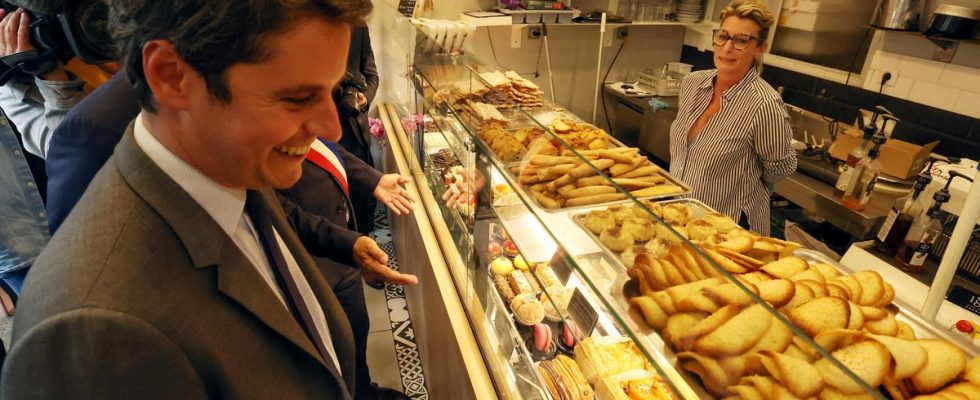Make the ultra-rich and defrauding multinationals pay what they owe”
No, you are not reading the latest leaflet from La France Insoumise, but rather the declarations of the Minister of Action and Public Accounts, Gabriel Attal. In an interview at World this Monday, he presented a series of measures against tax evasion: strengthening of penalties for the most serious fraud, 25% increase in the number of tax audits for the largest estates and a tax audit at least every two years for top 100 listed companies.
Regular targeting of the wealthiest is quite rare in Macronie, recognizes Alexandre Eyries, HDR teacher-researcher in information and communication science at the University of Lorraine. The specialist sees it as “a communication plan aimed at counterbalancing the reputation of being the government of the ultra-rich and restoring a little the image of the executive, severely heckled with the pension reform”.
In a report published in January 2018, the French Economic Observatory (OFCE) concluded that after two years of announced reforms, “there would be essentially winners” in the government’s fiscal policy, but that the ultra-rich would benefit much more than the most modest. And two measures taken during the first five-year term, the abolition of the wealth tax on the one hand, and the reduction of the APL by five euros on the other, have not ceased to stick to the skin of the government, the exposing it to criticism from its detractors.
Inconclusive announcements
Moreover, given this reputation and the historical protest against the postponement of the starting age to 64, Gabriel Attal’s announcements seem “very timid” in the eyes of Alexandre Eyries. Certainly, the ultra-rich are targeted, but we do not speak in the columns of the World the return of the wealth tax or other measures whose scope would have been more decisive, just “more controls, with ultimately very vague and imprecise declarations. »
For economist Thomas Piketty, the announcements will even be “totally ineffective”, with a government that is missing the point. “The first thing to do in the tax field would be to have declarations of assets pre-filled by the administration from the cadastre, business property registers, bank accounts and national and international portfolios, like the pre-filled tax returns, so that we can automatically check how much the wealthiest taxpayers really pay and correct the situation according to what we observe. “A precision far from the announcements of the government therefore.
Rescue the middle class
Still, by targeting multi-millionaires, the government is also making a gesture towards ordinary taxpayers. “My philosophy is to concentrate efforts [sur les ultra-riches] and to ease the pressure on the middle classes”, declared the minister, wishing to “relieve the pressure on the small taxpayer, the small boss, by massifying the regularization rather than launching a control […] There will now be an automatic penalty waiver for the first error. »
It is there, the real concern of the executive. “There has been a real choice by the government for several weeks to deal with the injustice felt by the middle classes. The feeling of being stuck between the very rich and the working classes who are helped, unlike the intermediate classes, ”says Bruno Cautrès, teacher at the Center for Political Research at Sciences Po. Let us cite pell-mell as measures the extension of the tariff shield, the extension of the fuel allowance to more deciles of salary, the increase in teachers’ income… In another interview with France Inter in April, Gabriel Attal, also announced that he wanted develop “a Marshall plan for the middle classes”.
The value of work, the heart of government communication
Difficult to make more clear. “The government wants to drive out the idea that the middle classes are always the victims of political measures. There, Gabriel Attal clearly announces that he will target the richest instead of the middle classes, ”continues Bruno Cautrès.
A roadmap that joins another philosophy of the government for several weeks, that of the famous work value, the last piece of the puzzle to understand the words of Gabriel Attal. “The government is targeting those who do not work, by imposing hours of work on RSA beneficiaries for example, but also those whose income can only be due to hard work, so the ultra-rich” , continues Alexandre Eyries. The goal: to show that the work of the middle classes is not in vain, and that it is the latter that really counts in the France desired by Emmanuel Macron.
Since the beginning of the social protest, the president is firmly convinced that the demonstrations also expressed “a desire to find meaning in his work, to improve the conditions”, and not only an opposition to the reform, according to his words during his final speech on April 17. A work deprived of all the revolutionary connotations of the first five-year term. “For a long time now, the executive has stopped talking about start-up nations or new economies, but simply about efforts,” recalls Bruno Cautrès. But to reconnect with all categories of French people, “it will still take a long time” concludes Alexandre Eyries.

